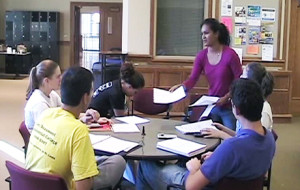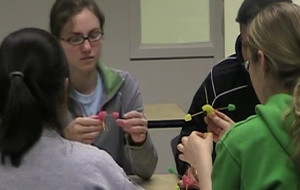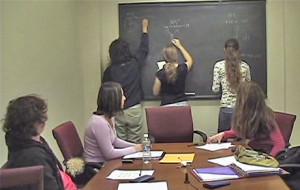The structure of PLTL at Washington University is different from that of the colleges and universities where PLTL programs were first developed, where the “parent” courses were typically smaller and there were no recitation sub-sections taught by graduate students.
Visit pltl.org for more information about the origination of PLTL.


PLTL Groups: Participant Contract
Once Washington University students have elected to participate in PLTL, they must each sign a contract that informs students of the following group-member obligations, designed to maintain consistent group membership and to foster effective group dynamics:
- Attend every PLTL session
- Arrive prepared
- Study cooperatively in a group
- Participate in new activities with an open mind
- Participate in evaluations of the PLTL program
- Inform the PLTL group leader ahead of time if the student cannot attend a meeting
- Refrain from discussing PLTL problems outside of the student’s group prior to the conclusion of all group meetings (which end by 9:00 pm on Sundays).
PLTL study groups meet once a week throughout the semester. Two excused absences are allowed; if a student misses more than two sessions, he or she will be asked to leave the group.
PLTL Problems: No Answers Provided
Instructors of the “parent” course design the weekly PLTL problem sets, and present them to Peer Leaders in the Practical Applications of Academic Mentoring (PAM) course in advance of weekly PLTL group meetings. Unlike traditional lab classes or recitations, PLTL leaders do not receive answer sheets for the weekly problem sets. Instead, they work in collaboration with their Peer Leader colleagues in PAM to solve the problem, thus practicing the problem-solving strategies and process skills that they will model for their PLTL groups.
Likewise, Peer Leaders do not provide problem set answers to their PLTL groups; they are trained to focus on facilitating the problem-solving process without commenting on whether the outcome is correct. Without an answer key, PLTL students must:
- Apply their critical-thinking skills to the problem-solving methods they employ;
- Seek out, analyze, and provide feedback on input from other group members; and
- Form tests of the reasonableness of their answers.
As a result, PLTL students develop process skills that can improve their performance in the parent course, and help them with how they meet other academic and professional challenges.
Peer Leaders: Ongoing Training and Support
 Each spring, undergraduates who have successfully completed General Chemistry, Calculus or Introductory Physics and who have actively participated in a PLTL group are invited to apply to be a Peer Leader. Selection criteria vary by department, but the process typically includes interviews with course instructors and current Peer Leaders. After a student has been selected as a Peer Leader, he or she enrolls for the Seminar in Academic Mentoring (SAM) and Practical Applications of Academic Mentoring (PAM), courses designed to create an active community of teaching and learning among the Peer Leaders. For more information about the selection, training, and supervision of the Leaders, see Peer Leader Training.
Each spring, undergraduates who have successfully completed General Chemistry, Calculus or Introductory Physics and who have actively participated in a PLTL group are invited to apply to be a Peer Leader. Selection criteria vary by department, but the process typically includes interviews with course instructors and current Peer Leaders. After a student has been selected as a Peer Leader, he or she enrolls for the Seminar in Academic Mentoring (SAM) and Practical Applications of Academic Mentoring (PAM), courses designed to create an active community of teaching and learning among the Peer Leaders. For more information about the selection, training, and supervision of the Leaders, see Peer Leader Training.